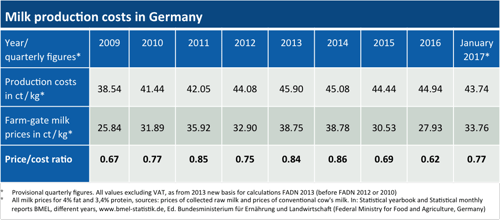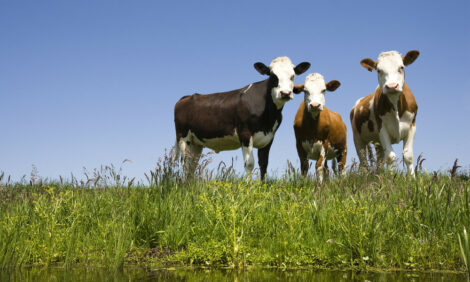



Production Costs in German Dairy Sector Covered by Farmgate Price
GERMANY - According to the latest cost study drawn up by the German Office for Agriculture and Agricultural Sociology (Büro für Agrarsoziologie & Landwirtschaft, BAL), in January 2017 the average price of 33.76 cents for a kilo of milk covered only 77 per cent of the costs (43.74 cents).The study, co-commissioned by the European Milk Board (EMB) and the MEG Milch Board, calculates the current costs of German milk production from EU figures and publishes them on a quarterly basis.
Whereas the cost situation in Germany has altered only slightly in recent months, prices throughout the EU have gone up slightly.
“The voluntary supply reduction scheme in the EU has curbed the growth in surpluses, putting a halt to the downward trend in prices”, says EMB President Romuald Schaber. For instance, when milk prices in Germany were still below 25 cents last July, in other countries the situation was just as drastic.
In July 2016, prices in Lithuania had even dropped to below 17 cents and to about 22 cents in Belgium. But it is unlikely that the current recovery there to 30 and 34 cents respectively in early 2017 thanks to the voluntary supply reduction scheme, which ran in late 2016 for three months, can be sustained for long. There are already increasing signs that soon prices will be back on a longer term decline, whereas further price rises are absolutely essential.
According to Mr Schaber, “It is important that we quickly establish a legal framework in the EU to enable us farmers to produce responsibly”. Without such a framework, dairy farmers would be practically forced in critical price situations to step up production, although that would be damaging to the entire market.
The EMB therefore calls on EU Commissioner Phil Hogan and the national Ministers of Agriculture to introduce a milk market crisis instrument based on the Market Responsibility Programme (MRP).
Mr Schaber said: “In recent years we farmers and the policy-makers alike have come to the clear realisation that an overflowing milk market is extremely damaging to us in many areas.”
With such a crisis instrument that automatically triggers off stabilisation measures like a voluntary restraint on supply in times of market turbulence, the EU could finally get to grips with the chronic crisis in the milk market.

TheCattleSite News Desk


